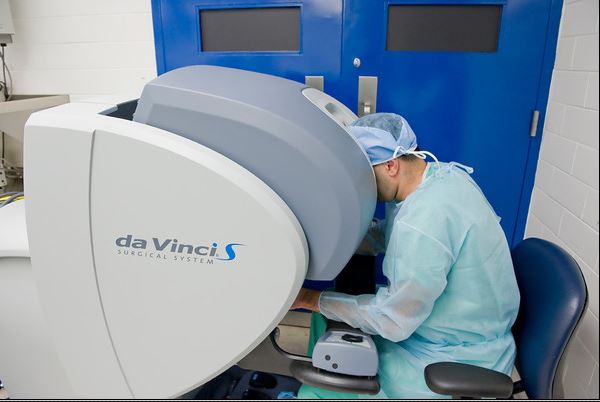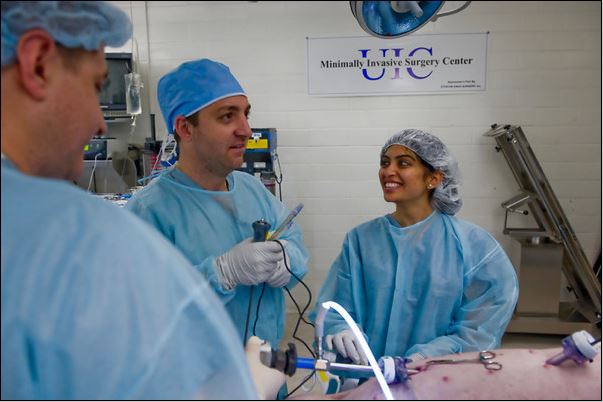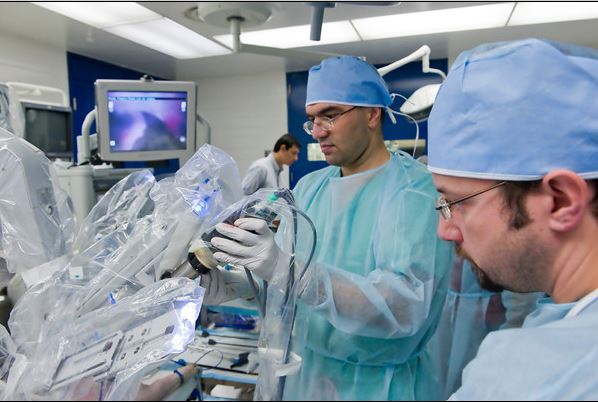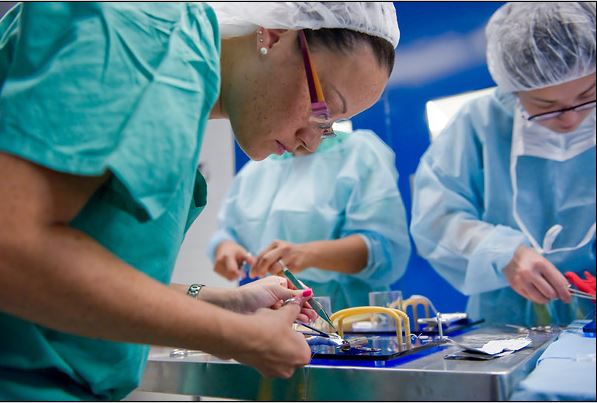General Surgery Residency Curriculum
Program Details Heading link
Our education program is designed to reflect the American Council on Graduate Medical Education (ACGME) six core competencies: patient care, medical knowledge, practice-based learning and improvement, interpersonal and communication skills, professionalism, and systems-based practice. Resident evaluation is based on the ACGME General Surgery Milestones which incorporate the six core competencies.
Our program draws on the unique strengths of its integrated hospitals to provide breadth and excellence in clinical teaching at the bedside, in the operating room coupled with structured educational conferences and a comprehensive curriculum based in the simulation lab and our robotic/laparoscopic skills lab.
Clinical Rotations Heading link
Throughout the training program, our residents rotate through these Surgical Specialties:
Clinical Rotations
- General Surgery
- Bariatric Surgery
- Minimally Invasive Surgery
- Colorectal Surgery
- Surgical Endoscopy
Clinical Rotations
- Surgical Oncology
- Breast Surgery
- Pediatric Surgery
- Plastic Surgery
- Wound Care
- Transplant Surgery
Clinical Rotations
- Vascular Surgery
- Cardiothoracic Surgery
- Surgical Intensive Care Unit
- Trauma Surgery
- Acute Care Surgery
Sample Rotation Schedule Heading link
-
Sample Rotation Schedule
1 2 3 4 5 6 7 8 9 10 11 12 13 FIRST YEAR CH-C WH-GS VA-VS CH-B CH-SICU CH-C CH-TR CH-A UI-GS UI-TX UI-ACS HOL CH-TR CH-SICU VA-GS UI-PS UI-PL CH-B CH-TR CH-C CH-TR UI-VS/CT UI-ACS HOL VA-VS UI-ONC UI-GS UI-ACS HOL CH-A UI-PS VA-VS VA-GS UI-TX VA-GU UI-ONC UI-CR WH-GS CH-SICU UI-GS UI-ONC UI-ACS HOL UI-CR VA-GS VA-VS VA-GU UI-TX WH-GS UI-PS UI-VS/CT CH-A VA-VS UI-TX UI-GS VA-GS CH-A UI-CR UI-ONC UI-ACS HOL UI-PS UI-VS/CT CH-C UI-GS SECOND YEAR UI-TX SH-CR CH-TR WH-GS BURNS SH-ICU VA-ICU/END UI-CR CH-TR CH-B VA-ICU/ END WH-GS SH-CR UI-TX CH-TR UI-CR CH-TR BURNS CH-B SH-ICU CH-B UI-TX WH-GS CH-TR SH-ICU SH-CR UI-CR CH-TR VA-ICU/END BURNS THIRD YEAR UI-GS UI-ONC UI-TX VA-GS UI-VS/CT VA-VS WH-GS VA-VS UI-TX UI-GS WH-GS VA-GS UI-ONC UI-VS/CT UI-TX WH-GS UI-VS/CT VA-VS UI-GS VA-GS UI-ONC FOURTH YEAR CH-ACS CH-TR CH-B CH-TR UI-PS CH-C UI-GS CH-B CH-TR CH-ACS CH-TR UI-GS UI-PS CH-C CH-TR UI-GS CH-C CH-ACS CH-B CH-TR UI-PS FIFTH YEAR UI-ONC CH-TR VA-GS CH_A UI-VAS/CT CH-C CH-B CH-C CH-B UI-ONC CH-TR VA-GS CH-A UI-VAS/CT UI-VAS/CT CH-C CH-B UI-ONC CH-TR VA-GS CH-A Rotation Key
Col A
- Burns- Stroger Hospital of Cook County Burns Service
- CH-ACS- Advocate Christ Medical Center Acute Care Service (Night Float) HOL- Vacation
- CH- A- Advocate Christ Medical Center Thoracic/ Peds Service
- CH- B- Advocate Christ Medical Center General Surgery Service
- CH- C- Advocate Christ Medical Center Vascular Surgery Service
- CH- SICU- Advocate Christ Medical Center surgical Intensive Care Unit
Col B
- CH- TR- Advocate Christ Medical Center Trauma Service
- SH-CR- Stroger Hospital of Cook County Colon/Rectal Service
- SH-ICU- Stroger Hospital of Cook County Intensive care Unit
- UI-ACS- University of Illinois Acute Care Service (Night Float)
- UI-GS- University of Illinois General Surgery Service
- UI-Onc- University of Illinois Surgical Oncology Service
- UI-PS- University of Illinois Pedatric Service
Col C
- UI-TX- University of Illinois Transplant Service
- UI VS/CT- University of Illinois Vascular/ Thoracic Service
- VA-GS- Jesse Brown VA General Surgery Service
- VA-ICU/ENDO- Jesse Brown VA Intensive Care Unit/ Endoscopy Service
- VA-VS- Jesse Brown VA Vascular Surgery Service
- WH-GS- Weiss Memorial Hospital General Surgery Service
Surgical Education Laboratory Heading link
-
PGY1 Residents

Each intern must attend 5 training lab sessions during the year, which will consist of principles and basics of minimally invasive surgery.
1st Lab session (Dry Lab)
Basic Skills
- Overview of surgical instruments- going through the various specialty trays; how to load staplers; names of various instruments
- Knots 101- an introduction to knot-tying (two- handed, one- handed, instrument tie, deep orifice tie)
Basic skills of Laparoscopic surgery
- Introduction to instruments & equipment
- Access and Camera navigation
- Use of Laparoscopic Instruments
- Tasks with direct view ( eye-hand coordination): Grasps
- Lift and grasp different size and texture objects.
Equipment requirements(knowledge, set up and use)
- Insufflation Machine-Type of Gas use
- Video Monitor, Light Sources
- Laparoscopic: Size 5 and 10mm. Angles (0, 30, 45 degree)
Instrumentation ( knowledge and use)
- Trocars
- Graspers/ Dissectors/Scissors
- Suturing: Devices, Needle Types, needle Holders
2nd Lab session (Dry Lab)
Basic skills of Laparoscopic surgery
- Access and Camera navigation.
- Use of laparoscopic instruments.
- Tasks with direct and laparoscopic view ( eye-hand coordination): Grasping, Cutting, Lift and grasp, and suturing.
- Dissection of different types of fruit peels. Trocar placement and its mechanism
- Top Gun
Equipment requirements ( set up, use and troubleshooting)
- Insufflation Machine
- Video Monitors, Light Sources
- Laparoscopic: Size 5 and 10 mm, Angles (0, 30, 45 degree)
Instrumentation (Knowledge and use)
- Trocars
- Graspers/Dissectors/Scissors
- Suturing: Devices, Needle Types, Needle Holders.
- Retractors: Size , applications
- Tissue approximation Devices: Clip Appliers, Linear Staples (size, application)
- Hemostatic Devices: Monopolar Cautery, Bipolar Cautery, harmonic
3rd Lab session (Dry Lab)
Basic skills
- Vascular anastomosis
- How to sew a basic vascular end to side anastomosis
Basic skills of Laparoscopic surgery
- Camera navigation
- Use of Laparoscopic instruments
- Tasks with laparoscopic view (hand-eye- monitor coordination): Grasping, Cutting ,Lift and grasp Intra-corporeal
- Suturing
Equipment requirements ( set up, use and troubleshooting)
- Insufflation Machine.
- Video Monitord
- Light Sources
- Laparoscopes:
- Size 5 and 10 mm
- Angles(0, 30, 45 degree)
Instrumentation (Knowledge and use)
- Trocars
- Graspers /Dissectors/Scissors
- Suturing: Devices, Needle Types, Needle Holders
- Retractors: Size, application
- Tissue approximation Devices: Clip Appliers, Linear Staples (size, application)
- Hemostatic Devices: Monopolar Cautery, Bipoloar Cautery , Harmonic
4th Lab session (Dry Lab)
Basic skills
- GI anastomosis – how to do a hand-sewn basic-anastomosis as well as stomas
Basic skills of Laparoscopic surgery
- Camera navigation
- Use of Laparoscopic Instruments
- Tasks with laparoscopic view (hand-eye-monitor coordination): Grasping, Cutting, Lift and Grasp, Intra-corporeal
- Suturing Clip applying, Precision & speed. Dissection and suturing on different types of animal tissues
5th Lab session (Dry Lab)
ICU procedure day
- How to do a central venous lines, arterial lines, chest tubes, diagnostic peritoneal lavage, compartment pressures, and abdominal compartment pressure
-
PGY2 Residents

Each resident must attend 5 training lab. Sessions during the year, which will consist in basic skills in open, laparoscopic and robotic surgery
1st Lab session (Dry Lab)
Basic skills
- Knots 101 – an introduction to knot –tying ( two-handed, one –handed, instrument tie, deep orifice tie)
- Overview of surgical instruments- going through the various specialty trays; how to load staplers; names of various instruments
Basic skills of Laparoscopic surgery
- Introduction to instruments & equipment
- Access and Camera navigation
- Use of Laparoscopic Instruments
- Tasks with direct (hand-eye coordination) and laparoscopic view ( hand-eye monitor coordination):
- Grasping, Cutting, Lift and grasp, Suturing, Clip applying, Precision& speed. Dissection of different types of fruit peels
Equipment requirements (knowledge, set up, use and troubleshooting)
- Insufflation Machine- Type of Gas use
- Video Monitors, Light Sources
- Laparoscopes: Size 5 and 10 mm, angles (0, 30, 45 degree)
Instrumentation ( Knowledge and Use)
- Trocars
- Graspers/Dissectors/Scissors
- Suturing: Devices, Needle Types, Needle Holders
- Retractors: Size, application
- Tissue approximation Devices: Clip appliers, Linear Staples (size, applications)
2nd Lab session (Dry Lab)
Basic Skills
- Vascular anastomosis – how to sew a basic vascular end to side anastomosis
- GI anastomosis – how to do a hand-sewn basic anastomosis as well as stomas
- Top Gun
- Basic skills of Laparoscopic surgery: Camera navigation
- Use of Laparoscopic Instruments
- Tasks with Laparoscopic view (hand – eye monitor coordination): Grasping, Cutting, Lift and grasp, Suturing, Clip applying, Precision & speed. Dissection and suturing on different types of animal tissues
3rd Lab session (Animal Lab)
Skills in Laparoscopic surgery
- Laparoscopic Cholecystectomy
- Principle of operative techniques: Proper instrument selection, trocar placement, exposure of the operating field and principle of intracorporeal suturing. Major complications and their avoidance
Equipment requirements ( Set up, use and troubleshooting)
- Video Monitors
- Light Sources
- Laparoscopes: Size 5 and 10 mm, Angles ( 0, 30, 45 degree
Instrumentation ( Knowledge and use )
- Trocars
- Graspers/Dissectors/Scissors
- Suturing: Devices, Needle Types, Needle Holders
- Retractors: Size, applications
- Tissue approximation Devices : Clip Appliers, Linear Staples ( size and application)
- Hemostatic Devices: Monopolar Cautery, Bipolar Cautery, Harmonic
4th Lab session (Animal Lab)
Skills in Laparoscopic surgery
- Diagnostic Laparoscopy
- Biopsy
- Lap Suturing
- Hemorrhage and hemostasis
- Laparoscopic Appendectomy and Gastrostomy
- Principle of operative techniques: Proper instrument selection, trocar placement, exposure of the operative field and intracorporeal suturing. Major complications and their avoidance
5th Lab session (Dry Lab)
Skills in Robotic Surgery: Introduction to Robotic Surgery
- Principles of Robotic Surgery
- Introduction to the DaVinci system
- Principles of functioning, set up and proper instrument selection
- Tasks with Robotic view (eye –hand coordination): Grasping, Cutting, Lift and grasp, and suturing
- Dissection of different types of fruit peels
-
PGY 3 Residents

Each resident must attend 6 laparoscopic training lab sessions during the year, which will consist in skills improvement in laparoscopic and robotic surgery.
1st Lab session (Dry Lab)
Basics of Laparoscopic surgery
- Camera navigation.
- Use of laparoscopic Instruments
- Tasks with Laparoscopic view ( hand-eye monitor coordination): Grasping, Cutting, Lift and grasp, Suturing, Clip applying, Dissection and suturing on different types of animal tissues, Precision & speed
- Top Gun
2nd Lab session (Animal Lab)
Skills in Laparoscopic Surgery
- Diagnostic Laparoscopy
- Biopsy
- Lap Suturing
- Hemorrhage and hemostasis
- Jejunostomy, Percutaneous Endoscopic Gastrotomy (PEG), Use of circular stapler
3rd Lab session (Animal Lab)
Skills in Laparoscopic Surgery
- Esophageal Surgery: Heller Myotomy, Lap Nissen and Upper Endoscopy
- Principle of operative techniques: Proper instruments selection, trocar placement, exposure of the operating field. Major complications and their avoidance
4th Lab session (Animal Lab)
Skills in Laparoscopic Surgery
- Ventral Hernia Repair
- Principle of operative techniques; Proper instruments selection, trocar placement, exposure of operating field. Major complications and their avoidance
5th Lab session (Animal Lab)
One group of residents will be assigned to the robotic room while the other two groups will be performing the Laparoscopic procedures. At certain intervals residents will rotate between rooms
Skills in Laparoscopic Surgery
- Solid Organ surgery: Hand Assisted Laparoscopic Splenectomy/ Nephrectomy/Adrenalectomy
- Principle of operative techniques: proper instruments selection, trocar placement, exposure of operating field
- Major complications and their avoidance
Skills In Robotic Surgery
- Principles of Robotic Surgery
- Introduction to the DaVinci system
- Principles of functioning, set up, and proper instrument selection.
- Tasks with Robotic view (eye-hand coordination): Grasping, Cutting, Lift and grasp, and suturing
- Dissection of different types of fruit peels
6th Lab session (Animal Lab)
One group of residents will be assigned to the robotic room while the other two groups will be performing the Laparoscopic procedures. At certain intervals residents will rotate between the rooms.
Skills in Laparoscopic Surgery
- Cholecystectomy
- Gastrojejunostomy
- Principle of operative techniques: Proper instruments selection, trocar placement, exposure of the operating field. Major complications and their avoidance
Skills in Robotic Surgery
- Cholecystectomy, Nissen fundoplication
- Principles of functioning, set up and proper instruments selection
- Principle of operative techniques: Proper instrument selection, trocar placement, exposure of operating field
- Major complications and their avoidance
-
PGY 4 Residents

Each resident must attend 6 Laparoscopic training lab sessions during the year, which will consist in skills improvement in laparoscopic an and robotic Surgery
1st Lab session (Animal Lab)
Fundamentals in Laparoscopic surgery course. (FLS)
Skills in Laparoscopic Surgery:
- Esophageal surgery: Heller Myotomy, Lap Nissen and Upper Endoscopy.
- Principle of operative techniques: proper instruments selection, trocar placement, exposure of the operating field.
- Major complications and their avoidance
2nd Lab session (Animal Lab)
Fundamentals in Laparoscopic surgery course. (FLS)
Skills in Laparoscopic Surgery:
- Solid organ surgery: Hand Assisted laparoscopic Nephrectomy/ Adrenalectomy/Splenectomy
- Principle of operative techniques: Proper instruments selection, trocar placement, exposure of operating field
- Major complications and their avoidance
3rd Lab session (Animal Lab)
Fundamentals in Laparoscopic surgery course. (FLS)
Skills in Laparoscopic Surgery
- Ventral Hernia Repair
- Principle of operative techniques: Proper instruments selection, trocar placement, exposure of operating field
- Major complications and their avoidance
4th Lab session (Animal Lab)
One group of residents will be assigned to the robotic room while the other two groups will be performing the Laparoscopic procedures. At certain intervals residents will rotate between rooms.
Skills in Laparoscopic Surgery: Colorectal Surgery ( Colectomy, Colostomy, Hand Assisted Colectomy)
- Principle of operative techniques: Proper instruments selection, trocar placement, exposure of operating field
- Major Complications and their avoidance
Skills in Robotic Surgery: Principles of Robotic Surgery
- Introduction to the DaVinci System
- Principles of functioning, set up, and proper instruments selection
- Tasks with Robotic view (eye-hand coordination): Grasping, Cutting, Lift and grasp, and suturing
- Dissection of different types of fruit peels
5th Lab session (Animal Lab)
One group of residents will be assigned to the robotic while the other two groups will be performing the Laparoscopic procedures. At certain intervals residents will rotate between rooms.
Skills in Laparoscopic Surgery
- Bariatric Surgery
- Principle of operative techniques: Proper instruments selection, trocar placement, exposure of the operating field. Major complications and their avoidance
Skills in Robotic Surgery
- Cholecystectomy, Nissen Fundoplication
- Principles of functioning. Set up and proper instrument selection
- Principle of operative techniques: Proper instruments selection, trocar placement, exposure of the operating field. Major complications and their avoidance
6th Lab session (Animal Lab)
One group of residents will be assigned to the robotic room while the other two groups will be performing the Laparoscopic procedures. At certain intervals residents will rotate between rooms
Skills in Robotic Surgery
- Cholecystectomy, Nissen Fundoplication
- Principle of functioning, set up and proper instrument selection
- Principle of operative techniques: Proper instruments selection, trocar placement, exposure of the operating field. Mayor complications and their avoidance
Didactic Conferences Heading link
Our program follows (SCORE) curriculum which is in conjunction with the weekly lecture schedule. The Wednesday morning conference is structured to cover the surgical curriculum yet remains varied to address all areas of surgical education, including critical appraisal of current literature as well as surgical case studies. The monthly Mock Orals is a regular opportunity for senior residents to experience the oral board examination and receive immediate constructive feedback. This has been notably helpful for the examinee, as well as audience. Our Journal Club is part of the lecture schedule to address critical review of literature. Our Clinical Correlations Conference affords the resident to present interesting surgical cases they have participated in to the Department of Surgery with the guidance of his/her Attending faculty member. This allows the resident experience in preparing and presenting topics in a public but comfortable venue. Throughout the pandemic, with the use of virtual platforms, we were able to continue our educational sessions with attendance from all residents and attending surgeons.
In addition to the weekly Wednesday conference attended by all residents, the surgical services at the different hospital sites may have separate teaching conferences, tumor board and morbidity and mortality conferences that the residents attend.
Simulation Lab, Resources and Assessment Heading link
Residents have access to the SITL (Surgical Innovation and Technology Lab) for monthly simulation curriculum. These sessions include a wide variety of experiences, including open skills, FLS preparation, in-service training on robotics, endoscopic training and didactics, minimally invasive courses, operating on animal models, and computerized simulation.
Residents have access to the SCORE learning bank, as the didactic schedule follows the SCORE curriculum. Weekly quiz assignments are given to those who are struggling and upon request. Residents have a subscription for the TrueLearn question bank throughout their training, as well as a board preparation feature prior to graduation. Other learning resources, such as textbooks and courses, are provided throughout training.
Residents are continuously assessed using various approaches. Formal evaluations are completed through New Innovations and SIMPL. Direct feedback is encouraged as well
Research Opportunities Heading link
In addition to a robust clinical experience, residents are encouraged to pursue research endeavors. There are 2-3 residents per class who on our Academic Track, taking non-clinical years for research. All of our residents are fully funded by our program during that time.
Even those who do not elect research years have plenty of opportunities to participate in surgical research. The program will cover the cost of publications, conference attendance and travel if you are presenting, and research costs. As a university hospital, there are ongoing projects within each division of surgery with plenty of support staff (research fellows, biostatisticians, medical illustrators, grant writers). We provide residents with the tools and mentorship necessary to foster their growth as future leaders in surgery